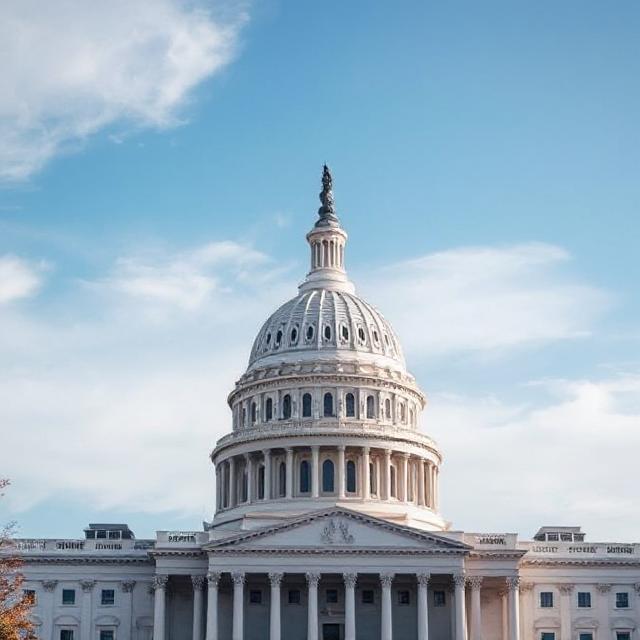One Big Beautiful Bill: Trump’s Transformative Legislative Package Reshapes American Policy
Introduction: A Legislative Victory for the Trump Administration
President Donald Trump’s signature domestic policy achievement has reached the finish line. The One Big Beautiful Bill Act, a sweeping piece of legislation that encompasses tax reform, border security, spending cuts, and numerous conservative priorities, has successfully navigated through both chambers of Congress and now awaits the President’s signature. This comprehensive 887-page bill represents one of the most significant legislative packages in recent American history, promising to reshape the nation’s fiscal landscape and policy priorities for years to come.
The legislation, officially designated as H.R.1 in the 119th Congress, embodies Trump’s campaign promises and represents a culmination of Republican policy objectives that have been years in the making. With its passage through Congress, the bill demonstrates the effectiveness of unified Republican control in Washington and the party’s ability to deliver on its core commitments to American voters.
The Journey Through Congress: From House to Senate
The One Big Beautiful Bill’s path through Congress has been both dramatic and decisive. The legislation first passed the House of Representatives in May 2025, marking a significant early victory for the Trump administration. House Republicans successfully marshaled their majority to advance the bill, with Ways and Means Committee leadership highlighting the transformative nature of the legislation.
The Senate’s consideration of the bill proved more challenging, as is typical for major legislation. The upper chamber engaged in what political observers called a “vote-a-rama,” a marathon voting session that lasted over 12 hours as senators considered numerous amendments to the bill. This intensive process, while exhausting for participants, demonstrated the thorough deliberation that accompanies significant legislative action.
Vice President JD Vance played a crucial role in the Senate proceedings, presiding over the chamber during critical votes and ensuring that Republican priorities remained intact throughout the amendment process. The Senate’s eventual passage of the bill on July 1, 2025, represented a resounding victory for the Trump administration and set the stage for the legislation’s return to the House for final approval.
The House’s final passage of the bill occurred on July 3, 2025, just hours before Independence Day, providing what President Trump called “no better birthday present for America.” This timing was particularly symbolic, as Republican leaders had worked tirelessly to ensure the bill reached the President’s desk before the July 4th holiday, emphasizing the patriotic significance of the legislation.
Comprehensive Tax Reform: The Heart of the Legislation
At its core, the One Big Beautiful Bill Act represents the most significant tax reform package in decades. The legislation extends and expands upon the major provisions of the 2017 Tax Cuts and Jobs Act, which were set to expire at the end of 2025. This extension ensures that millions of American families and businesses will continue to benefit from lower tax rates and simplified tax procedures.
The bill’s tax provisions are projected to reduce federal tax revenue by approximately $4 trillion between 2025 and 2034 on a conventional basis. However, when accounting for dynamic economic effects, including projected GDP growth of 0.8 percent, the cost decreases to approximately $3.1 trillion. This difference highlights the bill’s potential to stimulate economic growth and generate additional revenue through increased economic activity.
For working families, the legislation promises substantial benefits. According to analysis from the House Ways and Means Committee, families stand to gain over $13,000 in take-home pay, while workers could see wage increases of more than $11,000. These figures represent real money in the pockets of American families, providing them with greater financial security and purchasing power.
The bill includes a particularly innovative provision regarding overtime pay, fulfilling a key campaign promise from President Trump. Both House and Senate versions create a temporary tax break for overtime compensation, with the House-approved version establishing a deduction for “qualified overtime compensation” of $160,000 or less from 2025 to 2028. This above-the-line deduction means that workers will see immediate tax benefits from their overtime work, encouraging productivity and rewarding hard work.
For businesses, the legislation includes transformative provisions that will enhance American competitiveness. Manufacturers benefit from significant changes to how the tax code treats the construction of new manufacturing facilities. The bill allows businesses to fully and immediately deduct the cost of building new manufacturing facilities, providing a powerful incentive for domestic investment and job creation.
Border Security and Immigration Enforcement
The One Big Beautiful Bill Act addresses one of President Trump’s signature campaign issues through substantial investments in border security and immigration enforcement. The legislation includes dedicated funding for deportation operations, reflecting the administration’s commitment to enforcing immigration laws and securing America’s borders.
This border security component represents a significant departure from previous legislative approaches, which often separated immigration enforcement from broader domestic policy initiatives. By incorporating border security funding into the comprehensive bill, Republican leaders ensured that immigration priorities would receive the attention and resources they deserve.
The inclusion of border security provisions in the bill also demonstrates the interconnected nature of domestic policy issues. Strong border security contributes to economic security by ensuring that American workers face fair competition in the job market and that social services are directed toward those who are legally entitled to them.
Welfare Reform and Spending Reductions
The legislation includes significant reforms to federal welfare programs, implementing stricter eligibility requirements for Medicaid and the Supplemental Nutrition Assistance Program (SNAP). These changes reflect long-standing Republican priorities aimed at ensuring that government assistance reaches those who truly need it while encouraging self-sufficiency and work.
The Medicaid reforms included in the bill are designed to protect the program’s integrity while eliminating waste and fraud. By implementing more rigorous eligibility verification processes, the legislation aims to ensure that Medicaid resources are directed toward genuinely eligible recipients. This approach protects the program’s sustainability while maintaining its core mission of providing healthcare coverage to America’s most vulnerable populations.
The SNAP reforms similarly focus on work requirements and eligibility verification, encouraging able-bodied adults to engage in employment or job training programs. These provisions reflect the principle that government assistance should serve as a temporary safety net rather than a permanent substitute for work.
Overall, the bill achieves substantial spending reductions in non-military government programs while maintaining essential services. This approach reflects the Republican commitment to fiscal responsibility and limited government, ensuring that taxpayer dollars are spent efficiently and effectively.
Environmental and Energy Policy Changes
The One Big Beautiful Bill Act includes significant changes to federal environmental and energy policies, reflecting the Trump administration’s commitment to American energy independence and economic growth. The legislation eliminates various tax credits that have subsidized renewable energy initiatives, including credits for new and used electric vehicles, installation of home EV charging equipment, and insulation or energy-efficient heating and cooling systems.
These changes represent a fundamental shift in federal energy policy, moving away from government subsidies for specific technologies toward a more market-based approach. By eliminating these targeted tax credits, the legislation allows market forces to determine the most efficient and cost-effective energy solutions for American consumers and businesses.
The bill also ends the Greenhouse Gas Reduction Fund, which has provided funding to nonprofit organizations offering financing for climate-related projects. This change redirects federal resources away from climate-focused initiatives toward other priorities identified in the legislation, such as tax relief and border security.
Defense and Infrastructure Investments
While the One Big Beautiful Bill Act emphasizes spending reductions in many areas, it maintains robust funding for national defense and critical infrastructure projects. The legislation includes new money for national defense, ensuring that America’s military remains the strongest and most capable in the world.
The bill also addresses infrastructure needs, including provisions for modernizing air traffic control systems. These investments reflect the importance of maintaining and upgrading America’s critical infrastructure to support economic growth and national security.
The infrastructure components of the bill demonstrate the legislation’s comprehensive approach to governance, addressing both immediate needs and long-term strategic priorities. By investing in infrastructure while reducing spending in other areas, the bill reflects a disciplined approach to federal budget management.
Economic Impact and Job Creation
The One Big Beautiful Bill Act is projected to have substantial positive effects on the American economy. According to legislative analysis, the bill will secure more than 7 million jobs over the next four years, providing employment opportunities for American workers across various sectors.
The job creation benefits stem from multiple provisions within the legislation. The tax cuts and business incentives encourage domestic investment and expansion, while the regulatory reforms reduce compliance costs for businesses. The combination of these effects creates a more favorable environment for job creation and economic growth.
The legislation’s impact on wages is equally significant. The bill’s provisions are designed to increase worker productivity and business profitability, leading to higher wages and improved living standards for American families. The projected wage increases of more than $11,000 per worker represent meaningful improvements in family financial security.
Political Implications and Legislative Process
The passage of the One Big Beautiful Bill Act represents a significant political victory for President Trump and the Republican Party. The legislation demonstrates the effectiveness of unified Republican control in Washington and the party’s ability to deliver on its campaign promises to American voters.
The bill’s success also reflects the strategic approach taken by Republican leaders in Congress. By combining multiple policy priorities into a single comprehensive package, leaders were able to build a broader coalition of support and streamline the legislative process. This approach avoided the fragmentation that often occurs when individual issues are considered separately.
The legislation’s passage before the July 4th holiday was particularly symbolic, allowing Republican leaders to associate the bill with American independence and patriotic values. This timing emphasized the legislation’s role in promoting American prosperity and freedom.
Criticisms and Challenges
Despite its passage, the One Big Beautiful Bill Act has faced criticism from various quarters. Critics argue that the legislation’s tax cuts disproportionately benefit wealthy individuals and corporations, while the spending cuts primarily affect programs that serve low-income Americans.
Opposition voices have also raised concerns about the bill’s long-term fiscal impact, arguing that the substantial tax cuts will increase federal deficits and national debt. These critics contend that the projected economic growth may not be sufficient to offset the revenue reductions, potentially creating fiscal challenges for future generations.
Environmental advocates have criticized the elimination of renewable energy tax credits, arguing that these changes will slow America’s transition to clean energy and harm the environment. They contend that the bill represents a step backward in addressing climate change and promoting sustainable energy development.
Implementation and Timeline
With the bill’s passage through Congress, attention now turns to implementation. The legislation includes various effective dates for different provisions, with many taking effect immediately upon the President’s signature. The tax provisions, in particular, are designed to provide immediate relief to American families and businesses.
The overtime tax deduction provision runs from 2025 to 2028, providing a defined timeframe for this benefit. This temporary nature allows policymakers to evaluate the provision’s effectiveness and make adjustments as needed in future legislation.
The border security and immigration enforcement provisions will require coordination between multiple federal agencies to ensure effective implementation. The Department of Homeland Security, Immigration and Customs Enforcement, and other agencies will need to work together to utilize the additional funding provided by the legislation.
Impact on Future Legislation
The One Big Beautiful Bill Act’s passage sets important precedents for future legislative efforts. The successful use of the comprehensive approach, combining multiple policy priorities into a single package, may influence how Congress approaches major legislation in the future.
The bill’s emphasis on tax relief, border security, and spending reductions reflects core Republican priorities that are likely to continue influencing party policy positions. The legislation’s success may encourage similar approaches in future congressional sessions.
The timing of the bill’s passage, coming early in President Trump’s term, also provides a foundation for additional legislative initiatives. With this major achievement completed, the administration can turn its attention to other priorities while building on the economic and policy momentum created by the bill.
International Implications
The One Big Beautiful Bill Act’s passage has implications beyond America’s borders. The legislation’s emphasis on American manufacturing and domestic investment may affect international trade relationships and global economic dynamics.
The bill’s tax incentives for domestic manufacturing could encourage companies to relocate production facilities to the United States, potentially affecting manufacturing employment in other countries. This reshoring effect aligns with the administration’s America First agenda and its commitment to rebuilding American manufacturing capacity.
The legislation’s border security provisions may also influence international migration patterns and relationships with neighboring countries. The enhanced enforcement capabilities funded by the bill could affect how other nations approach their own immigration and border security policies.
Looking Forward: Long-term Implications
The One Big Beautiful Bill Act represents more than just a legislative victory; it embodies a vision for America’s future that prioritizes economic growth, border security, and fiscal responsibility. The legislation’s long-term implications will unfold over the coming years as its various provisions take effect and influence American society and economy.
The bill’s success in passing through Congress demonstrates the continued appeal of conservative policy solutions and the effectiveness of unified Republican governance. This achievement may influence future elections and policy debates, providing a model for how conservative principles can be translated into effective legislation.
The legislation’s emphasis on American workers and families reflects a broader political movement that prioritizes domestic concerns over international commitments. This approach may continue to influence American politics and policy-making in the years to come.
Conclusion: A Defining Moment for American Policy
The passage of the One Big Beautiful Bill Act represents a defining moment for American domestic policy. The legislation’s comprehensive approach to tax reform, border security, spending reductions, and economic development reflects a coherent vision for America’s future that prioritizes prosperity, security, and freedom.
President Trump’s promise to deliver meaningful change to American families and businesses has been fulfilled through this landmark legislation. The bill’s projected benefits, including substantial tax relief, job creation, and wage increases, provide tangible improvements to the lives of millions of Americans.
The legislation’s success also demonstrates the importance of political leadership and effective governance. By working together to advance this comprehensive package, Republican leaders in Congress and the Trump administration have shown that significant policy achievements are possible when there is unity of purpose and commitment to shared principles.
As the bill moves to President Trump’s desk for signature, it marks the culmination of a legislative process that began with campaign promises and concludes with concrete policy achievements. The One Big Beautiful Bill Act stands as a testament to the power of democratic governance and the ability of elected officials to deliver on their commitments to the American people.
The legislation’s impact will be felt for years to come, influencing everything from family finances to business investment decisions to America’s role in the global economy. In signing this bill, President Trump will cement his legacy as a leader who delivered on his promises and advanced policies that promote American prosperity and security.
The One Big Beautiful Bill Act represents more than just legislation; it embodies a vision of America that is prosperous, secure, and free. Through its comprehensive approach to domestic policy, the bill addresses the fundamental challenges facing American families and businesses while positioning the nation for continued growth and success in the years ahead.











